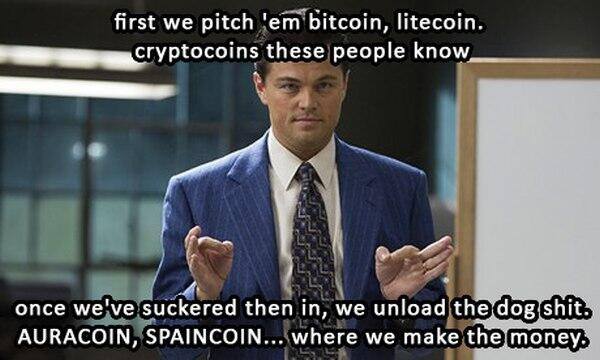Pump and dumps, which have long been synonymous with cryptocurrency markets, are facing a clampdown. Bittrex has emphasized its determination to combat the practice, which persists on several exchanges. In an update to its terms of service, Bittrex reiterated that it takes a dim view of pump and dump schemes, and will suspend accounts found to have been participating in such activity.
What Goes Up…
Pump and dumps were around long before cryptocurrency – and indeed the internet – became a thing. They can be traced back to the stock markets, as immortalized in Jordan Belfort’s penny stocks scene from The Wolf of Wall Street.

In the altcoin era, there are mainly two forms these controversial schemes take:
Fake News: Using message boards, social media, and blogs, a particular cryptocoin is hyped and shilled, sometimes with screenshots of fake news regarding new platform developments, exchange listings, and mainstream partnerships. The aim is to get buyers to snap up the coins, thereby inflating their price before buyers who got in early can dump their holdings and perform a sharp exit. This behavior can take place over a period of hours, days, or weeks.
Flash Pumps: The other principal pump and dump involves members of a closed group who are all in on the scam. When the name of the coin to be pumped is announced, it’s a race to buy in and then dump it on the stragglers before they in turn do the same with buyers who come after them. It’s essentially a game of chicken: a contest to see who’ll blink first and offload their holdings. A huge vertical green candle followed by a corresponding red one characterizes flash pumps, which can rally and crash in a matter of minutes.
…Must Come Down

Telegram groups with names such as Crypto4pumps and Bigcryptopumps conspire to pick micro-cap coins with low volume, often on the Bittrex exchange. Currently the world’s second largest bitcoin exchange, with a 24-hour volume of $1.2 billion, Bittrex is a prime target. The site lists almost 300 coins and tokens, many of which have minimal sell walls, making them vulnerable to manipulation.
In a recent update to its trading policy, Bittrex announced that “stale” orders of more than 28 days would be removed and the minimum trading order size would be increased. It concluded with a “general statement about market manipulation tactics”, writing:
Bittrex actively discourages any type of market manipulation, including pump groups. Consistent with our terms of service, we will suspend and close any accounts engaging in this type of activity and notify the appropriate authorities.
Pump Up the Volume

Prohibiting P&Ds and preventing them are two very different matters of course. Coins that have rapidly appreciated in value are prominently displayed on the frontpage of Bittrex, luring in more buyers. Be it due to greed or FOMO, some traders blindly follow the green candles, chasing pumps with scant consideration for the reason behind the coin’s sudden spike.
Less charitable souls will say that investors who don’t perform their own research deserve everything they get. Nevertheless, as cryptocurrency goes mainstream, rampant manipulation of coins does little to endear the already volatile markets to new entrants. An influx of institutional money has helped the cryptocurrency markets swell to nearly $300 billion. The wild west days of the earliest bitcoin exchanges are long gone; perhaps it’s time that pump and dumps were also laid to rest.

Traders who recall bitcoin’s earliest days may shed a wry smile at the mention of such words as ‘Fontas’ and ‘trollbox’. It was a time when every coin had a small market cap and currencies such as Peercoin and Feathercoin were sent to the moon on Btc-e before plummeting into the abyss. For so long as illiquid coins continue to be listed on major exchanges, P&Ds will continue to happen. Newcomers to the space, who are intrigued by the get-rich-quick promise of such schemes, would do well to learn that the most profitable move is often to buy bitcoin and hold. It’s one of the few trading strategies that’s been shown to consistently pay dividends.


















No comments